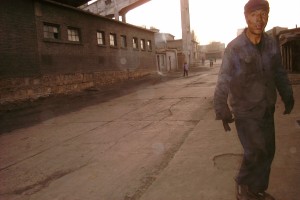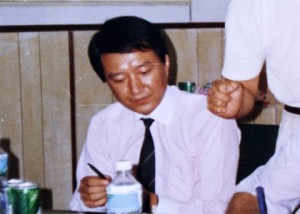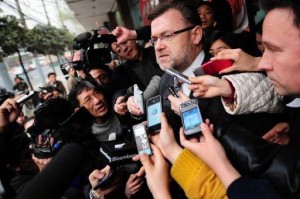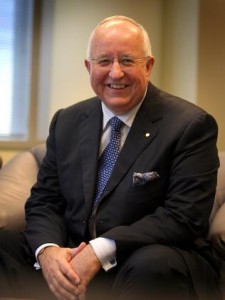A Response to Rio Tinto – A Different Opinion from Australia
 On Monday, I posted my take on the Rio Tinto trial which elicited significant response from China law scholars. I was lucky to have a very thoughtful response from Prof. Vivienne Bath of the University of Sydney and Director of the Centre for Asian and Pacific Law at the University of Sydney.
On Monday, I posted my take on the Rio Tinto trial which elicited significant response from China law scholars. I was lucky to have a very thoughtful response from Prof. Vivienne Bath of the University of Sydney and Director of the Centre for Asian and Pacific Law at the University of Sydney.
Prof. Bath has a different perspective on the Rio Tinto trial and you can find her comments below. She also points out two mistakes that I made in the original article. In the original article, I state that foreign press was permitted into the bribery portion of the trial. This is incorrect. They were only permitted access to the verdict and sentencing portion. A second mistake is that I state that there was live witness testimony; there was not. There was only the presentation of written testimony; not actually live witness testimony. I have made these corrections to the original article and my apologies to the readers.
I thank Prof. Bath for her response to my article and for giving me permission to post it to China Law & Policy to offer a different perspective.
I was interested in Elizabeth Lynch’s comments on the Stern Hu trial now that it is all over (bar the appeals). Her post presents an interesting and different view of the trial to that often presented in the press. Certainly some of the comments by politicians (on both sides) have been fairly unconstructive and some of the press coverage could have been better informed.
In particular, Elizabeth makes some very apposite comments on the process. It appears to be the case that Chinese authorities followed the letter of the Criminal Procedure Law, although their interpretation of the Australia-China Consular Agreement was, in my opinion, completely unjustified. Regular visits by the consul were allowed as was access to lawyers. Time limits were strictly observed. Apparently a 71 page judgment was produced (which is quite unusual!) justifying the court’s conclusions, which is very welcome (or will be, if and when the judgment is made publicly available).
I do not think, however, that the fact that the Chinese authorities complied with Chinese laws should be a matter for particular congratulation. The content of those laws is bound to be the subject of comment. The press (and the Australian public), for example, probably took access to a lawyer for granted – they were more interested in the fact that Hu’s wife was apparently not allowed to visit her husband at all during his period of detention.
In addition, there are still some issues relating both to the trial and to the Chinese legal system itself which are continuing matters for concern regardless of the guilt or innocence of the parties. First, it appears that the foreign media was not admitted to any part of the trial, although several representatives of the state media may have been present. See http://www.abc.net.au/news/stories/2010/03/22/2852611.htm; http://www.theaustralian.com.au/business/media/the-world-watches-stern-hu-case-as-media-coverage-is-gagged/story-e6frg996-1225846613332 . The Australian press was, as you would expect, very indignant on this point. News reports were provided by brief comments from the Department of Foreign Affairs and Trade representative, who was quite succinct in his comments.
Secondly, I did not see any references to witnesses testifying in person at the trial and I would be interested to see the links to reports on this. Indeed, Du Shuanghua’s devastating evidence on the payment of RMB70 million was given in writing, with, according to reports, Wang Yong indignantly asking that Du appear in person so that he could be cross-examined (http://mulrickillion.spaces.live.com/blog/cns!41BA4803555B0DA4!5445.entry ). The entire trial, involving 4 defendants and a variety of complex charges, took less than 3 days, which is not consistent with the presentation of detailed personal testimony and cross-examination. The point has been made that written testimony is often presented in trials conducted under the inquisitorial system. Article 47 of the Criminal Procedure Law, however, does provide for the testimony of witnesses to be questioned and cross-examined in the courtroom. Although Chinese trials often take less time than this, and, it does not take away from the main point, which is that such a short time period is completely inadequate to allow defendants to conduct cross-examination of witnesses (if they are there) or to present their own cases in detail.
Thirdly, in relation to the length of the sentences, it should be noted that a sentence of 3-7 years for infringing on commercial secrets can only be handed out “if the consequences are especially serious”. The court justified the sentences as follows: ” ‘The four have seriously damaged the interests of the Chinese steel enterprises and put those enterprises in an unfavourable place (during) the iron-ore negotiations, which led to the suspension of the negotiations in 2009,’ Judge Liu told a packed court room. He said this behaviour caused overpayment of 1.108 billion yuan by industry players, including Shougang Steel and Liagang Steel. The interest alone on this was more than 11 million yuan.” (http://www.theaustralian.com.au/business/mining-energy/bribes-forced-china-to-overpay-for-iron-ore/story-e6frg9df-1225847190730 ). This is really quite an extraordinary conclusion for any judge to make, particularly in the confused and political atmosphere surrounding the iron ore negotiations.
Fourthly, Australia does have an obligation under its Criminal Code, which codifies its obligations under the OECD Convention, to prosecute bribery of foreign officials. Although Australia is nowhere near as active as US authorities, Australia has just revised its law to increase the penalties significantly. The Australian government can hardly prosecute Stern Hu, however, because he has already been convicted in China. In relation to Rio Tinto, if the Chinese authorities thought Rio was implicated, Article 220 of the Criminal Law provides the basis for prosecution of a “unit”. The action of the Chinese authorities in closing the trial and failing to produce any evidence publicly on the commercial secrets charge is not helpful for an Australian investigation. In any event, it appears that agencies in the US, the UK and Australia are looking at Rio’s behaviour – see http://www.watoday.com.au/business/just-what-is-a-chinese-commercial-secret-remains-a-secret-20100416-skmv.html . We do not know if the Australian Federal Police have commenced or will subsequently commence an investigation under the Criminal Code. Rio Tinto’s comments suggest doubt about whether the “commercial secrets” were in fact secret, but it has in any event issued new guidelines to its employees operating in China (http://www.riotinto.com/documents/Media-Speeches/2010AGM_transcript.pdf ).
The final question is the standard of the press coverage. Without commenting on the press outside Australia, I do not think that the mainstream Australian press can be accused of using “bad facts” making “bad journalism”. There was front-page coverage of the trial and considerable commentary, as one would expect, since an Australian citizen and one of Australia’s most important companies were involved, but the main Australian newspapers, The Age, The Australian and The Sydney Morning Herald appeared to go to considerable trouble to ensure that their coverage was accurate. They published reports on the judgment and details on the court findings on bribery with as much enthusiasm as they published reports on the criminal system and the process of the trial itself. As for the Australian government, given the unease that the timing of the arrests and the lack of transparency regarding the trial caused in Australia, I think that the Australian government’s behaviour and comments were fairly restrained (unlike the Chinese foreign affairs spokesperson, whose comments were quite provocative). Opposition politicians in Australia were less restrained in criticising the Chinese legal system and the Australian government for alleged inaction and failing to stand up for Australia’s interests, but that is the nature of opposition politicians in a democratic system.
It should be appreciated that this trial touched on a number of very sensitive points in Australia – the influx of massive amounts of proposed Chinese investment in the natural resources area, particularly by state-owned enterprises, has caused considerable public unease; there was considerable publicity about the proposed Chinalco investment in Rio Tinto, with the shareholders and BHP actively campaigning against it, and front-page coverage of the China Iron and Steel Association’s effort to take over conduct of the annual iron ore pricing negotiations. All of these issues were widely discussed in the Australian press, not just the business press, due to the importance of natural resources in supporting the Australian economy in the midst of the global financial crisis. The timing of the arrests – directly after the withdrawal of the Chinalco bid and the collapse of the iron ore negotiations – combined with the involvement of the Ministry of State Security and the original focus on “state secrets” was guaranteed to attract widespread publicity and encourage the belief that the entire criminal investigation was politically motivated. Unfortunately, the conduct of the trial – and the fact that the prosecution started with the employees of Rio rather than the employees of the Chinese steels mills – has done very little to dispel that belief. I do not think that this can be blamed on the press – it is, after all, their duty to report, and the case, and the circumstances surrounding it, certainly gave the press enormous amounts of material.
–Vivienne Bath, Associate Professor, University of Sydney
All expressions of opinion in this comment, and any associated errors, are entirely my own.
 On Facebook
On Facebook By Email
By Email 



